Starting a coffee shop is a dream for many, the smell of roasted beans, the sense of community, and the promise of turning a passion into profit.
But beyond the charm lies a complex cost structure that surprises many first-time entrepreneurs. Around 30% of new coffee shops in the US close within the first year, and close to 50% within three years, mainly due to underestimating startup and operational costs.
Opening a coffee shop in the UK is no different. From real estate and equipment to licences and labour, the investment required can vary greatly based on format, location, and the services offered.
This guide will walk you through every major expense and consideration so you can properly budget, plan, and brew success.
What’s the Average Cost to Open a Coffee Shop in the UK?
Startup costs for a UK coffee shop typically range between £40,000 and £350,000, depending on factors such as size, location, and service style. Mobile coffee setups, for instance, require less infrastructure and capital than a seated café or a drive-thru.
| Coffee Shop Format | Estimated Startup Cost |
| Mobile Coffee Cart/Truck | £40,000 – £140,000 |
| Coffee Kiosk or Stand | £70,000 – £120,000 |
| Coffee Shop with Seating Only | £90,000 – £300,000 |
| Drive-Thru Coffee Shop | £90,000 – £220,000 |
| Hybrid (Seating + Drive-Thru) | £110,000 – £350,000 |
| Franchise Coffee Shop | £160,000 – £400,000+ |
Many factors contribute to these numbers, including interior design, permits, equipment, staff training, and location-specific rent. The model you choose significantly influences not only initial investment but also long-term operational costs.
How Do Coffee Shop Formats Impact Startup Costs?
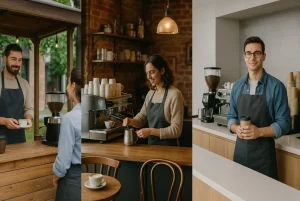
Coffee shop cost formats range from compact mobile units to fully equipped dine-in cafés, and each comes with its own financial implications.
Seated Café
Traditional cafés with seating areas are among the most expensive to open. Not only must you budget for equipment and ingredients, but also furniture, décor, and customer amenities. If located in high-footfall areas, costs can exceed £300,000 due to high rents and premium build-out.
Drive-Thru Only
A drive-thru-only model can cut costs associated with interiors but requires outdoor infrastructure such as car lanes, ordering systems, and illuminated menus.
Budget requirements usually fall between £90,000 and £220,000, depending on site size and vehicle access.
Hybrid Format
Combining seated and drive-thru services provides flexibility and broader customer reach. However, it also combines the cost burdens of both setups, often reaching £350,000 .
Coffee Kiosk
Kiosks are compact setups found in shopping centres, transport hubs, or office complexes. With less space and fewer furnishings required, startup costs range between £70,000 and £120,000, though high-location leasing fees may apply.
Mobile Coffee Carts
Mobile setups offer the lowest barrier to entry, with startup costs starting at £40,000. However, these businesses still require high-quality equipment, branded vehicles, and special permits, especially in urban areas.
Which Coffee Shop Equipment Is Most Expensive?
Your choice of equipment plays a critical role in budget planning. Commercial-grade machines are not only more durable but also improve efficiency and drink consistency.
| Equipment Type | Estimated Cost (GBP) |
| Espresso Machine (Commercial) | £4,000 – £18,000 |
| Coffee Grinders | £800 – £2,000 |
| Refrigeration Units | £1,500 – £4,000 |
| Dishwashers | £1,000 – £3,000 |
| Ovens and Blenders | £800 – £2,500 |
| POS Systems | £1,200 – £3,500 |
Buying new, high-quality equipment upfront may feel expensive but reduces downtime, repair costs, and service delays in the long run.
It’s essential to invest in equipment aligned with your menu, a coffee-focused shop needs less than one serving fresh meals all day.
How Much Should You Budget for Location and Rent?
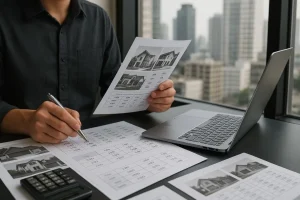
Location is one of the most significant cost drivers when starting a café. High-traffic areas bring footfall, but they also bring premium rental prices.
Space Requirements by Format
| Format | Typical Size (Sq. Ft.) |
| Mobile Cart | N/A |
| Coffee Kiosk | 100 – 300 |
| Seated Café | 800 – 1,500 |
| Drive-Thru | 1,000 – 1,800 |
Monthly rent can range from £2,000 to £10,000, depending on region, building quality, and visibility. Build-out and renovation costs may add £120 to £280 per sq. ft., especially if the property wasn’t originally set up for food service.
Choosing the right spot is more than just cost, it also affects branding, pricing strategy, and daily footfall. Location decisions should also factor in parking, signage visibility, and delivery access.
What Legal and Licensing Costs Should Be Expected?
Before you pull your first espresso, your business must meet several legal obligations. While these aren’t the biggest costs on your list, they are essential and should not be overlooked.
- Food Business Registration with your local council (free, but mandatory 28 days before opening)
- Food Hygiene Certificates for all food-handling staff, costing between £50 and £200
- Public Liability and Employer’s Insurance, which usually ranges from £300 to £700 annually
- Signage and Planning Permissions, which can vary depending on council jurisdiction and signage scale
- Alcohol Licensing (if applicable), which starts at £100 and can exceed £1,000
It’s also wise to budget for legal consultation, especially when signing a lease or establishing a partnership. These services can cost £500 to £2,000 depending on complexity.
How Much Do Staff and Barista Training Cost?
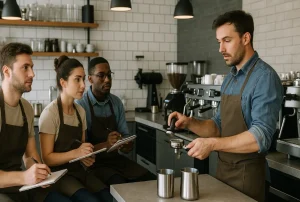
Staffing and training are not just costs, they are investments in your customer experience. Friendly, skilled baristas create returning customers and increase average spend.
Pre-launch costs for recruitment, uniforms, and training can range from £7,000 to £20,000 depending on team size. Training should include customer service, drink preparation, and health and safety protocols.
Post-launch, staffing will be your largest monthly operational cost. A modest team running a 7-day operation could cost £6,000 to £10,000 per month, including wages, national insurance contributions, and pensions.
Soft openings and hands-on training in your actual shop environment are strongly recommended for smoother grand openings and service consistency.
What Does It Cost to Market a New Coffee Shop?
Many shop owners underestimate the importance, and cost, of marketing. A strong opening campaign builds awareness and drives early footfall, especially in competitive areas.
Pre-launch marketing budgets typically include:
- Brand design and logo: £300 – £1,000
- Website and basic SEO: £500 – £2,000
- Signage and printed materials: £500 – £1,500
- Launch event or promotion: £1,000 – £3,000
Post-launch, ongoing marketing should consume about 3% to 6% of your monthly revenue. Effective campaigns may include loyalty programmes, social media, and collaborations with local businesses.
Ignoring marketing is one of the leading reasons many well-located shops fail to meet their revenue targets in the early months.
Should You Open a Franchise or Independent Coffee Shop?
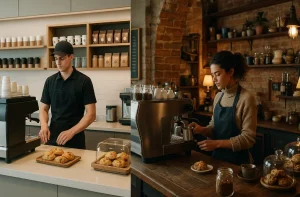
This decision impacts not just startup cost but also operational freedom, branding, and long-term profitability.
Franchise models offer support, training, and built-in brand recognition. However, they also involve higher initial investment and ongoing fees. Expect to invest £160,000 to £400,000+, with franchise fees typically between £20,000 and £50,000, plus royalties on gross sales.
Independent cafés allow full creative control over the menu, design, and branding. The upfront equipment costs may be lower, £50,000 to £350,000, but all operations, marketing, and problem-solving fall solely on the owner.
| Feature | Franchise Café | Independent Café |
|---|---|---|
| Startup Cost | £160K – £400K+ | £50K – £350K |
| Franchise Fee | £20K – £50K | None |
| Monthly Royalties | 4% – 8% of gross sales | None |
| Creative Control | Limited | Full |
| Training and Support | Provided | Self-arranged |
Choosing between the two depends on your personality, budget, and goals as a business owner.
What Are the Most Common Budgeting Mistakes First-Time Owners Make?
Unexpected fees, delays, and maintenance costs can derail even the most well-thought-out plans. Many owners forget to account for waste disposal contracts, equipment servicing, or recurring licence renewals.
Over-Investing in Design
While a beautifully designed space is inviting, function must come first. Prioritise workflow, safety, and equipment layout before investing heavily in décor.
No Contingency Fund
Even a minor problem, a broken water heater, supplier delay, or last-minute inspection, can affect cash flow. Experts recommend setting aside 10% to 15% of total startup costs as a contingency fund.
Delayed Automation
Manual processes can work during the initial weeks but slow down service as volume increases. Investing early in POS systems, scheduling apps, and inventory software saves time and reduces human error.
How Can You Fund Your Coffee Shop Startup?

Funding is a major hurdle for many aspiring café owners. Some rely on savings, but many seek external financing.
Popular funding sources include:
- Personal savings or investments
- Business loans from banks or UK government-backed Start Up Loans
- Credit cards and lines of credit
- Family and friend loans
- Crowdfunding platforms like Kickstarter or GoFundMe
- Silent partners or equity investors
Having a well-researched business plan with financial projections will improve your chances of securing funding from traditional institutions.
Conclusion
So, how much does it cost to open a coffee shop in the UK? Depending on your concept, it could be as little as £40,000 or well over £400,000. Every aspect, from your location and equipment to your licences and team, contributes to the final number.
Yet, despite the challenges, the UK coffee market continues to grow. With careful planning, smart budgeting, and a genuine passion for hospitality, your café could become a staple in your local community.
A great coffee shop doesn’t start with coffee beans, it starts with informed decisions, realistic budgets, and strategic execution.
Frequently Asked Questions (FAQ)
How much does it cost to open a small coffee shop?
Small coffee shops typically require £80,000 to £150,000, depending on the setup, format, and location.
Is a mobile coffee cart cheaper to open?
Yes. Mobile carts usually start at £40,000, making them the most affordable format for new owners.
Do I need a food hygiene certificate?
Yes, it’s a legal requirement for anyone handling food or drinks in the UK .
What’s the best way to fund a coffee shop?
Funding options include personal savings, bank loans, government-backed startup loans, or investor partnerships.
How soon can I expect to turn a profit?
Most coffee shops aim to break even within 12 to 24 months, depending on footfall, pricing, and expenses.
Can I open a café without experience?
Yes, but success requires research, hands-on training, and a willingness to learn continuously.
Are franchise cafés more profitable?
Not always. While franchises offer structure and branding, independent cafés enjoy higher profit retention and creative control.
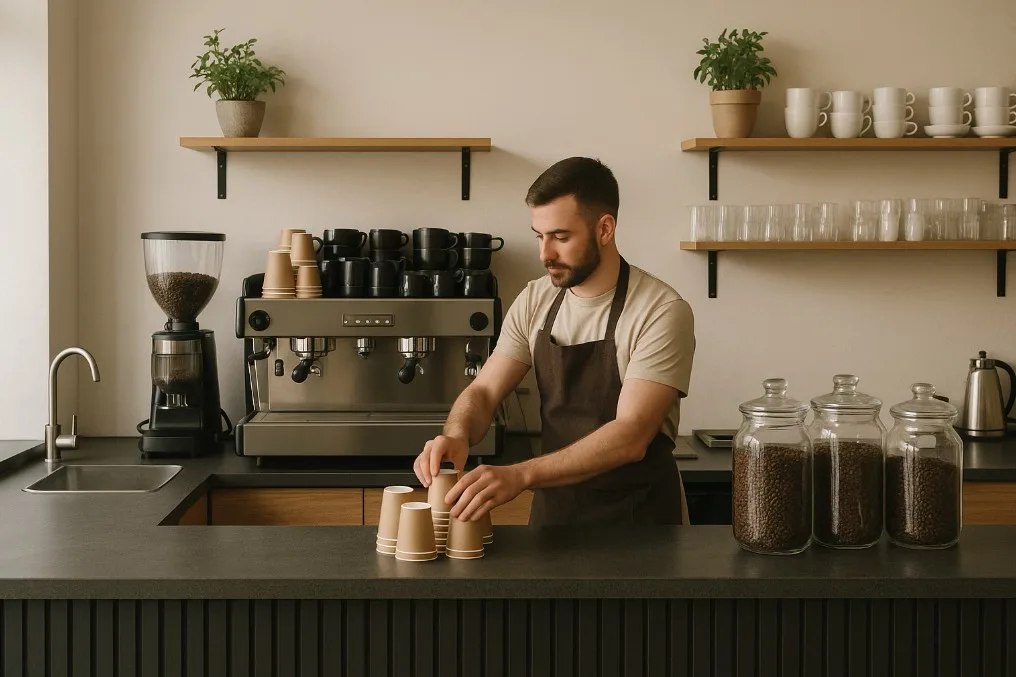
Leave a Reply